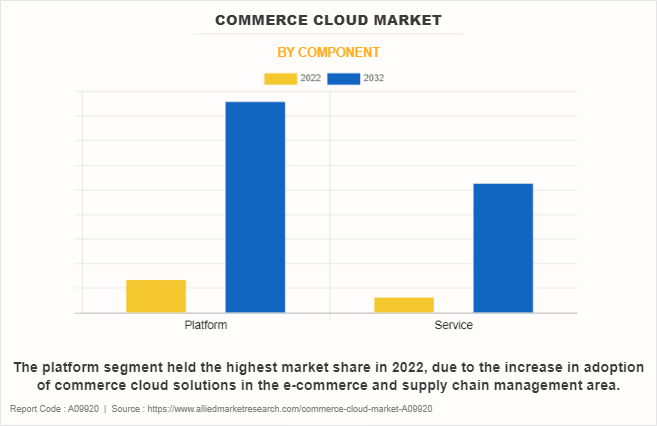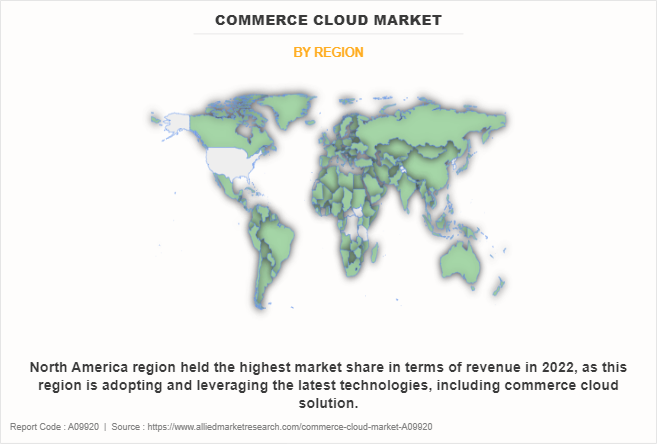Commerce Cloud Market Overview
The global commerce cloud market was valued at USD 19.2 billion in 2022, and is projected to reach USD 138.2 billion by 2032, growing at a CAGR of 22.2% from 2023 to 2032.
Surge in digital transformation and the growing trend of e-commerce platforms is likely to expand the adoption of commerce cloud solutions and services among organizations. Retailers are utilizing cloud-based technologies to enhance consumer interactions, personalize suggestions, and boost digital conversion rates. Additionally, customers now have more access to commerce cloud because of ongoing technological breakthroughs in areas like big data analytics, cloud computing, machine learning, and artificial intelligence (AI). Such enhanced factors are expected to provide lucrative opportunities for market growth during the forecast period.

Commerce cloud is one of the leading B2C and B2B commerce solutions. A multi-tenant, cloud-based platform for commerce called commerce cloud enables organizations to design intelligent, unified purchasing experiences across all channels, including mobile, social, online, and physical stores. Numerous tools and features of the commerce cloud enable businesses to offer products and services online, enhance customer communication, and automate sales and marketing tasks. In addition, it empowers retail businesses to gain a better understanding of their business operations, respond to market dynamics, and make more informed decisions to expand growth opportunities and profitability. The increasing volume and variety of different data have the potential to create several benefits for retail businesses and consumers.
In addition, to provide a consistent and tailored omnichannel experience, businesses can connect and analyze data from physical stores, e-commerce platforms, mobile apps, and other channels using commerce cloud. However, data security and privacy concerns can deter the adoption of market in businesses. Furthermore, increasing application of advanced technologies such as blockchain and AI is expected to provide numerous opportunities for the commerce cloud market forecast. Moreover, the surge in integration of 5G technology in businesses is expected to offer remunerative opportunities for the expansion of the commerce cloud industry during the forecast period.
Segment Review:
The commerce cloud market is segmented into component, type, enterprise size, application, and region. On the basis of component, it is bifurcated into platform and service. By type, it is divided into public, private and hybrid. By enterprise size, the market is classified into large enterprises and small and medium-sized enterprises. By application, the market is segregated into fashion & apparel, electronics & appliances, food & beverages, pharmaceutical & grocery and others. Region wise, it is analyzed across North America, Europe, Asia-Pacific, and LAMEA.

On the basis of component, the platform segment in 2022 dominate the global commerce cloud market and is expected to maintain its dominance in the upcoming years, owing to the increasing adoption of cloud computing solutions in the e-commerce and supply chain management sector. However, the service segment is expected to witness the highest growth, as the services segment in the commerce cloud market provides consulting, implementation, integration, training, and support services to businesses.

By region, North America dominated the commerce cloud market share in 2022. This region is known for its technological advancements and innovation. The expanding presence of online retail solutions providers and increased focus on improving customer insights are the major factors that boost market growth in this region. However, asia pacific commerce cloud market is expected to exhibit the highest growth during the forecast period. This is because of its increasing technological investments specifically in cloud computing and other analytical technologies, which in turn is expected to provide lucrative growth opportunities for the market in this region.
Key Market Players
Key Players in the commerce cloud such as IBM Corporation, Salesforce.com, Inc., SAP SE, Oracle Corporation, BigCommerce Pty. Ltd., Amazon Web Services, Inc., Apttus Corporation, Shopify Inc., Magento and Sitecore.
Top Impacting Factors
Growing Proliferation of Smartphones
The rise in the trend of smartphone devices in several sectors and among individuals is directly influencing the growth of the global commerce cloud market. In addition, customers are increasingly using their mobile phones for online shopping, with customers purchasing through mobile applications or mobile-optimized websites. These mobile transactions' generated data offer important insights into consumer behavior, preferences, and purchasing trends. Consequently, commerce cloud solutions are gaining significant adoption to increase the use of IT and control systems among retail operators, particularly smartphone usage and other digital technologies.
In addition, increased use of smartphones and the internet helps consumers to easily access online shopping platforms, by simply downloading the e-commerce application on their phones. Such ease of access has contributed to the high growth adoption for the global market, which in turn is expected to contribute to the increased installation of commerce cloud solution globally.
Furthermore, the integration of smartphones and the internet solution enables an effective user experience for commerce cloud services. Retailers are increasingly presenting mobile applications to interact with consumers and offer personalized shopping experiences. Hence, these multiple benefits offered by smartphones and internet use in retail operations will boost the demand for the cloud-based commerce platform market.
Moreover, several public and private organizations are continuously involved in promoting digitalization in retail operations. For instance, in July 2023, Google Cloud partnered with the National Cooperative Union of India, through this partnership the organizations have launched e-commerce app for cooperatives to provide scalable, easy to use technology for economic empowerment of the cooperatives which in turn, augments the cloud-based commerce platform market growth on a global scale.
Increase in Growth of E-commerce Industries in Several Countries
The rise in the growth of e-commerce industries all over the globe and increasing investment by public and private authorities to expand online retail platforms are impacting the commerce cloud market growth. E-commerce platforms produce an extensive amount of data, such as user profiles, browsing routines, past purchases, product reviews, and more. Retailers can use this information to gain insightful knowledge about consumer preferences, buying trends, and other concerns. This is attributed to the rising number of countries adopting online shopping software or applications.
Further, businesses are undertaking increased initiatives to embrace advanced technology, with plans for integrating a new digital platform to modernize retail systems. For instance, in January 2023, Microsoft partnered with Salesforce, through this alliance, the businesses launched Smart Store Retail Tech to accelerate the next generation of retail operations. Therefore, such commerce cloud market trends are expected to create opportunities for the businesses during the forecast period.
Moreover, the online retail sector provides a variety of information about the consumer's journey, from first browsing to ultimate purchase. Furthermore, with the help of commerce cloud, it allows retailers to track and analyze the entire customer journey, including clickstreams, cart abandonment, product recommendations, and post-purchase behavior. Such advancements in the retail sector will eventually contribute towards the global commerce cloud market growth.
Regional Insights:
The market in North America held a market share of over 35% in 2023. The market is experiencing significant growth driven by the increasing adoption of digital transformation strategies and advanced cloud technologies among businesses. The rapid shift towards e-commerce and omnichannel retailing is a primary factor as companies seek to enhance customer experiences and operational efficiency: major technology hubs and a highly developed infrastructure further support market expansion. Opportunities in North America include leveraging AI and machine learning for personalized customer experiences and expanding into emerging sectors like IoT and blockchain to drive innovation in commerce solutions.
U.S. Commerce Cloud Market Trends
The market in the U.S. is growing significantly at a CAGR of 19.1% from 2024 to 2030. The US market is thriving due to the rapid adoption of cloud-based solutions by a diverse range of industries, including retail, manufacturing, and technology. The market is bolstered by high investment in innovation and infrastructure, alongside a strong emphasis on enhancing customer engagement through digital channels. The increasing need for agile, scalable solutions to handle large transactions and customer interactions presents growth opportunities.
Asia Pacific Commerce Cloud Market Trends
The market in Asia Pacific is growing at the fastest CAGR of 26.1% from 2024 to 2030. In Asia Pacific, the market is driven by the region's rapid economic growth, increasing internet penetration, and a burgeoning middle class. The expansion of e-commerce platforms and digital payment systems across countries like China, India, and Southeast Asian nations is a significant growth driver. Opportunities in this region include capitalizing on the rising demand for localized solutions and mobile-first strategies and addressing the unique challenges of data privacy and regulatory compliance in diverse markets. The growing focus on digital transformation in enterprises also presents substantial growth potential for commerce cloud solutions.
Europe Commerce Cloud Market Trends
Themarket in Europe is growing significantly at a CAGR of 22.5% from 2024 to 2030. This is due to the region's focus on digitalization and regulatory advancements that promote cloud adoption. The European Union’s General Data Protection Regulation (GDPR) has driven businesses to seek cloud solutions that ensure data security and compliance. In addition, the rise of cross-border e-commerce and the demand for scalable and flexible cloud platforms fuel growth. Opportunities lie in integrating advanced analytics and AI to offer tailored solutions for diverse consumer preferences and regulatory environments across European countries.
Key Industry Developments:
In May 2024, Salesforce unveiled three new commerce cloud innovations to enhance commerce site development and checkout processes. These updates boost revenue and deliver highly personalized customer experiences, addressing the heightened expectations for seamless, omnichannel integration.
In September 2023, Merkle unveiled a global accelerator for Salesforce Commerce Cloud, enhancing its integration with Contentful and Magnolia. This new tool facilitates a modern, composable, API-first architecture, speeding up brand implementation. By streamlining the connection between Salesforce Commerce Cloud and leading content management systems, Merkle boosts time to market and innovation in front-end consumer experiences. This advancement underscores Merkle’s leadership in eCommerce technology and supports businesses in efficiently adopting headless content management solutions.
Key Benefits for Stakeholders:
The study provides an in-depth commerce cloud market analysis along with the current trends and future estimations to elucidate the imminent investment pockets.
Information about key drivers, restraints, and opportunities and their impact analysis on the commerce cloud market size is provided in the report.
The Porter’s five forces analysis illustrates the potency of buyers and suppliers operating in the commerce cloud industry.
The quantitative analysis of the global commerce cloud market for the period 2022–2032 is provided to determine the commerce cloud market potential.
Commerce Cloud Market Report Highlights
| Aspects | Details |
| Market Size By 2032 | USD 138.2 billion |
| Growth Rate | CAGR of 22.2% |
| Forecast period | 2022 - 2032 |
| Report Pages | 285 |
| By Type |
|
| By Application |
|
| By Component |
|
| By Enterprise Size |
|
| By Region |
|
| Key Market Players | Digital Rivier, Amazon Web Services, Inc., IBM Corporation, Shopify Inc.,, Salesforce.com, Inc., SAP SE, Sitecore, Magento Inc (Adobe), Oracle Corporation, BigCommerce Pty. Ltd. |
Analyst Review
As the commerce cloud industry continues to evolve, CXOs are evaluating the opportunities and challenges regarding this emerging technology. The commerce cloud industry is increasingly rising due to the large volume of data generated by consumers on offline stores and online shopping platforms. Businesses consider the benefits that commerce cloud offers, such as enhanced customer experience, improved operational efficiency, and cost optimization. In addition, the commerce cloud helps organizations to gain a competitive advantage, essential in the retail industry. Such factors are expected to provide lucrative opportunities for market growth during the forecast period.
Furthermore, by analyzing data on inventory levels, supply chain performance, and workforce management, the commerce cloud identifies areas for improvement, streamline processes, and reduce costs. In addition, the commerce cloud enables businesses to optimize resource allocation, identify operational bottlenecks, and improve overall business efficiency. However, businesses recognize the challenges associated with commerce cloud. One of the primary challenges in commerce cloud is ensuring the quality and consistency of data, which makes it complex for retail organizations to integrate and maintain the data for analysis. In addition, implementing and effectively utilizing commerce cloud requires a skilled workforce with expertise in data analysis, statistical modeling, and data visualization, which is a barrier to growth of market.
Furthermore, to handle enormous data volumes and complete difficult analytics tasks, commerce cloud frequently demands a strong technological infrastructure. Businesses must integrate the solutions and services based on the advanced technological setup, including factors such as scalability, reliability, and security. By addressing these challenges, businesses unlock the full potential of commerce cloud to transform their retail operations, create value, and gain a competitive advantage in their industry. For instance, in June 2023, Salesforce unveiled its new Payments Partner Network – a marketplace powered by Commerce Cloud. The Payments Partner Network features third-party partners that are integrated with the J.P. Morgan Payments platform, making it easy for clients to discover, search, and learn more about relevant J.P. Morgan partner product solutions, unlocking opportunities for growth and efficiency.
Surge in digital transformation and the growing trend of e-commerce platforms is likely to expand the adoption of commerce cloud solutions and services among organizations.
North America is the largest market for the Commerce Cloud.
Commerce Cloud Market is expected to reach $138,175.70 Million, by 2032.
The key growth strategies for Commerce Cloud include product portfolio expansion, acquisition, partnership, merger, and others.
IBM Corporation, Salesforce.com, Inc., SAP SE, Oracle Corporation, BigCommerce Pty. Ltd., Amazon Web Services, Inc., Apttus Corporation, Shopify Inc., and others
Loading Table Of Content...
Loading Research Methodology...



